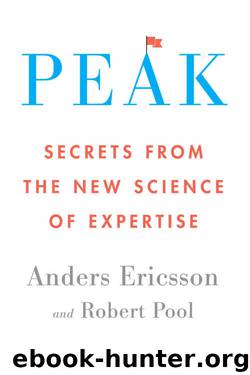Peak: Secrets from the New Science of Expertise by Anders Ericsson & Robert Pool

Author:Anders Ericsson & Robert Pool [Ericsson, Anders]
Language: eng
Format: epub, mobi, azw3
Publisher: Houghton Mifflin Harcourt
Published: 2016-04-05T06:00:00+00:00
IF YOU DON’T HAVE A TEACHER
The last time we encountered Benjamin Franklin in this book, he was playing chess for hours and hours but never really getting any better. This provided us with an excellent example of how not to practice—just doing the same thing over and over again without any focused step-by-step plan for improvement. But Franklin was far more than a chess player, of course. He was a scientist, inventor, diplomat, publisher, and a writer whose words are still read more than two centuries later. So let us give equal time to an area in which he did much better than he did in chess.
Early in his autobiography Franklin describes how as a young man he worked to improve his writing. The education he had received as a child had left him, by his own assessment, not much more than an average writer. Then he ran across an issue of the British magazine The Spectator and found himself impressed by the quality of the writing in its pages. Franklin decided that he would like to write that well, but he had no one to teach him how. What could he do? He came up with a series of clever techniques aimed at teaching himself how to write as well as the writers of The Spectator.
He first set out to see how closely he could reproduce the sentences in an article once he had forgotten their exact wording. So he chose several of the articles whose writing he admired and wrote down short descriptions of the content of each sentence—just enough to remind him what the sentence was about. After several days he tried to reproduce the articles from the hints he had written down. His goal was not so much to produce a word-for-word replica of the articles as to create his own articles that were as detailed and well written as the original. Having written his reproductions, he went back to the original articles, compared them with his own efforts, and corrected his versions where necessary. This taught him to express ideas clearly and cogently.
The biggest problem he discovered from these exercises was that his vocabulary was not nearly as large as those of the writers for The Spectator. It wasn’t that he didn’t know the words, but rather that he didn’t have them at his fingertips when he was writing. To fix this he came up with a variation of his first exercise. He decided that writing poetry would force him to come up with a plethora of different words that he might not normally think of because of the need to fit the poem’s rhythm and the rhyming pattern, so he took some of the Spectator articles and transformed them into verse. Then, after waiting long enough that his memory of the original wording had faded, he would transform the poems back into prose. This got him into the habit of finding just the right word and increased the number of words he could call up quickly from his memory.
Download
Peak: Secrets from the New Science of Expertise by Anders Ericsson & Robert Pool.mobi
Peak: Secrets from the New Science of Expertise by Anders Ericsson & Robert Pool.azw3
This site does not store any files on its server. We only index and link to content provided by other sites. Please contact the content providers to delete copyright contents if any and email us, we'll remove relevant links or contents immediately.
The Inner Game of Tennis by W. Timothy Gallwey(3433)
Unstoppable by Maria Sharapova(3389)
Urban Outlaw by Magnus Walker(3221)
Crazy Is My Superpower by A.J. Mendez Brooks(3182)
Mind Fuck by Manna Francis(3012)
The Social Psychology of Inequality by Unknown(2723)
The Fight by Norman Mailer(2651)
Unstoppable: My Life So Far by Maria Sharapova(2362)
Accepted by Pat Patterson(2201)
Going Long by Editors of Runner's World(2193)
Futebol by Alex Bellos(2102)
The Happy Runner by David Roche(2099)
Motorcycle Man by Kristen Ashley(2097)
Backpacker the Complete Guide to Backpacking by Backpacker Magazine(2094)
The Sports Gene: Inside the Science of Extraordinary Athletic Performance by David Epstein(2038)
Sea Survival Handbook by Keith Colwell(2027)
Peak: Secrets from the New Science of Expertise by Anders Ericsson & Robert Pool(1904)
Endure by Alex Hutchinson(1848)
The Call of Everest by Conrad Anker(1763)
